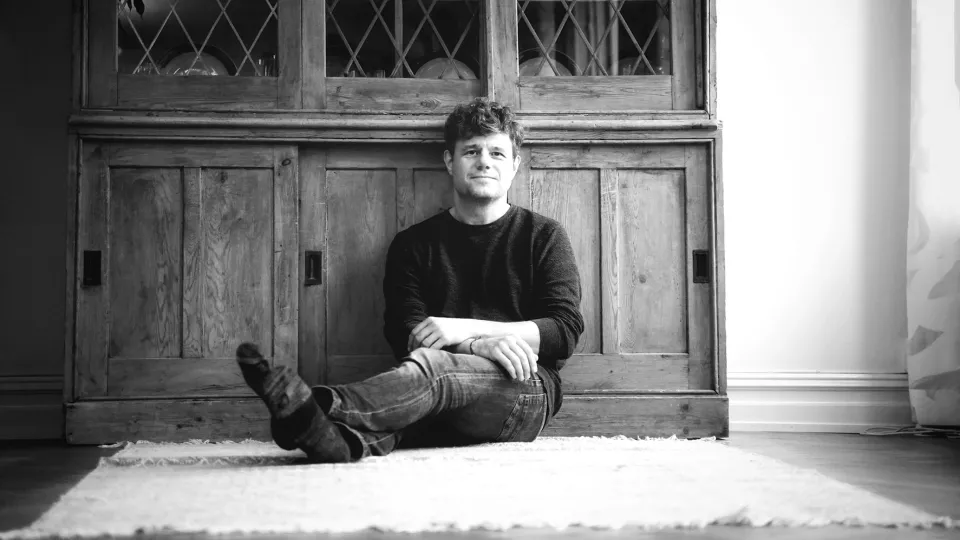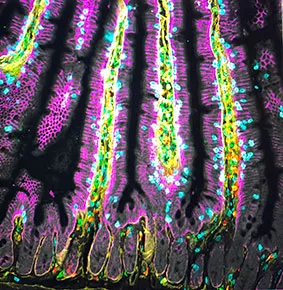Firstly, you were recently elected a member of the Royal Swedish Academy of Sciences´ Class for Medical Sciences, for outstanding services to science. Why you?
Well of course you will need to ask the nominating committee, but I assume it is a result of my group’s scientific contributions to medicine and the broader research community.
What does it mean for you as a researcher, to have been elected?
It makes me proud of my own and my current and previous group members’ achievements over the years.
How did you end up in Science?
I fell into it. I was selling carpets on Mårtenstorget, a market square in Lund, applying for all kinds of jobs and answered an advert from Department of Clinical Immunology, LU for a lab technician job. The position was already taken but I was asked if I wanted to start a Ph.D. I was pretty desperate for a job at that point so decided to give it a try and never looked back.
Can you please explain what your research is about?
How long have I got? We study the immune system primarily in the intestinal mucosa. This site is of interest because it is the largest area of the body that is exposed to the outside environment. It is constantly exposed to trillions of beneficial microbes that inhabit our gut and we must tolerate these bacteria as well as the foodstuffs we eat.
At the same time the intestine is a major site of many of our most prevalent infections and the mucosal immune system must mount protective immune responses to such pathogens. In fact, the intestinal immune system is very complex and the intestine, even in healthy individuals, contains more immune cells than anywhere else in the body. When intestinal immune responses to foreign material is not appropriately regulated things can go horribly wrong and lead to, for example, inflammatory bowel disease, IBD; Crohn’s disease and ulcerative colitis, and have a major impact on many other diseases throughout the body.
Your specific research projects right now?
I currently split my working life between my laboratories in Lund and DTU, Denmark and, although we have many synergistic technical and scientific interactions, the two laboratories have slightly different focus areas. My group in Lund focuses primarily on understanding the importance of a rare type of immune cell, called dendritic cells, in driving different types of immune responses in the intestine and how this is altered in inflammation. Here in particular, we are assessing how different subsets of dendritic cells drive distinct adaptive T cell responses and what local environmental signals may regulate these responses. In Lund I am also running a KAW project together with two other groups within the immunology section and one group at the Faculty of Science assessing the importance of these cells and other innate immune cells during bacterial infection. My laboratory in Denmark has for several years focused on analyzing human intestinal tissues, something that proved difficult to perform at LU. Here we have developed novel techniques to examine distinct immune compartments along the length of the human intestine in health and disease and were delighted to recently receive a large grant from the Helmsley Trust, USA to generate a single cell atlas of these niches in health and in Crohn’s disease. The DTU lab also focuses heavily on understanding the development and function of mesenchymal stromal cells, a structural non-immune cell present in all tissues, in intestinal immune homeostasis and disease.
If successful, what might your research mean to patients in the future?
I do not think one should define successful research as research that will help patients in the future. This is not the goal of our research but a potential consequence. Studying basic mechanisms to improve understanding have traditionally resulted in many scientific breakthroughs, some of which have subsequently been shown to have major benefits for human health. I would not like to predict if and how our research will do so in the future, but I naturally hope it does.
Immunology is the research area of last years Nobel Prize in Medicine. Looking forward, is this an area which might get more attention now?
Certainly, last year’s Nobel prize served to further highlight the importance of immunology in general and more specifically in cancer. Many other countries, for example the US, UK, have long recognized the importance of immunology in most of today’s diseases and in maintaining health, and research funds for understanding mechanisms of immune system function have been allocated appropriately. Your question is perhaps more a symptom of how immunology is perceived in Sweden. In my opinion, medical research funding in Sweden has been far too focused on ‘specific diseases’ and the rather unclear field of ‘translational science’ with too little emphasis on basic science and mechanisms that may have relevance in multiple disease settings. Immunology, as an overriding research field, has had difficulties profiling itself under such conditions, you only need to look at the title of the various VR-medicine panels. Only time will tell whether things will change. Perhaps things will get better for the field in Sweden if politicians allow more public funding to be allocated to researcher initiated bottom up research and less to medical research fields they ‘feel’ at the time important. Who knows which areas the next true break throughs will come from? I certainly do not.
What are the current trends within immunology research right now?
There is currently much focus on targeting immune pathways in cancer therapies, autoimmune and inflammatory disease. The realization that immunological processes contribute to many other diseases including for example atherosclerosis and neuro-degenerative diseases certainly makes it an exciting time for immunologists, but with it the need for investment in modern research equipment and technologies and cross-field collaborations. In my own field there is of course a lot of interest in understanding the interactions between the immune system and the microbiota, how such interactions fine tune immune system function and development, impact on body wide disease susceptibilities, and can be potentially targeted to improve human health.
And now more congrats. You have made it to the fokus.se-list for the 100 most quoted Swedish scientists of medicine and life sciences! Did you know you had made it to the list? How do you feel about it?
I don’t know what this is but sounds nice.
You made it to 50th place, out of a 100. Do you have any thoughts on why your research is this interesting to your researcher colleagues?
We as a group always strive to perform as impactful and stringent science as possible within the means available to us. This often entails not following the crowds and current trends but to continually push our research efforts to novel ground. Strategically we have not feared leaving areas where we have developed a strong track record if they become crowded with research groups from considerably stronger environments and with more resources than ourselves.
Agata Garpenlind

